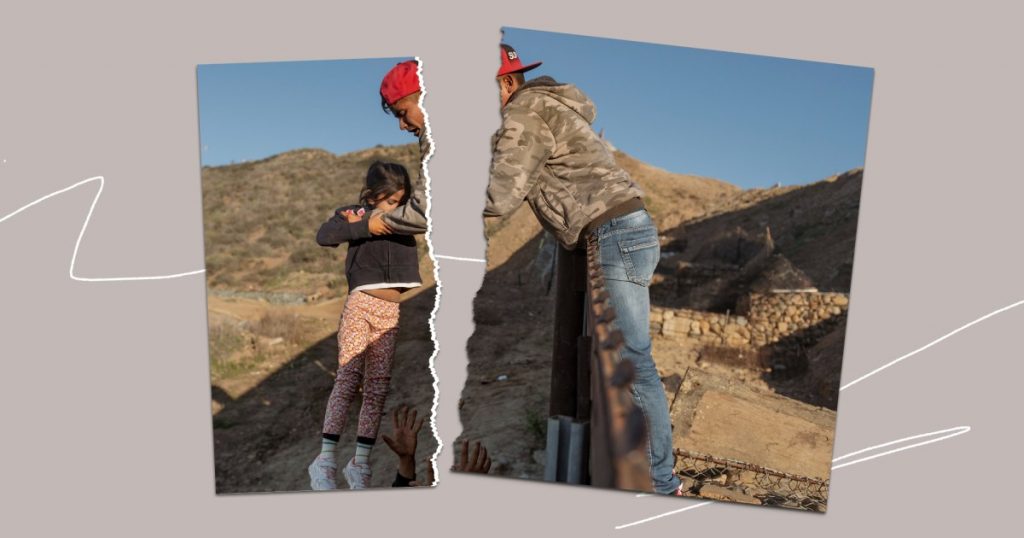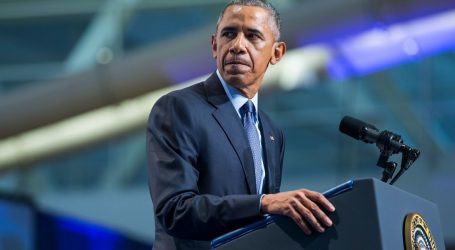The Migrant Families Separated Under Trump Are Still in Legal Limbo
Mother Jones; Daniel Ochoa de Olza/AP
Fight disinformation: Sign up for the free Mother Jones Daily newsletter and follow the news that matters.In the spring of 2018, attorney Christie Turner-Herbas returned from parental leave to her job at Kids in Need of Defense (KIND), a nonprofit serving unaccompanied migrant children, to find that her “universe was on fire.” During the previous summer, the Trump administration had quietly started to roll out a policy, which then-Attorney General Jeff Sessions would later officially announce as “zero tolerance.” Aimed at deterring would-be migrants from heading to the United States, the infamous practice called for criminally prosecuting those who crossed the border unlawfully and, in the process, forcibly separating children from their parents and other relatives.
By the summer, KIND had sent lawyers to the US-Mexico border, including Turner-Herbas, who was tasked with leading the organization’s response to family separation. She began to meet with parents who had been sent to US Immigration and Customs Enforcement (ICE) detention. And to meet the children, who had been transferred to the custody of the Office of Refugee Resettlement (ORR), an agency within the Department of Health and Human Services. “They were traumatized, distraught,” she says.
Looking back at that time, Turner-Herbas, now KIND’s senior director of special programs, recalls how difficult it was to leave her newborn at home while still breastfeeding, sometimes having to pump milk at an ICE facility. But unlike many of the parents she was visiting who had no idea where their sons or daughters were, Turner-Herbas took comfort in thinking, “this is a temporary time being away from my baby.” For those families, she realized even then, “it was going to take years and years to undo the damage that was done in just a few months.”
Indeed, almost six years later, the ordeal for families separated at the border under Trump’s “zero tolerance” regime is far from over—and their ability to stay in the United States is in limbo. Last year, the US government reached a settlement in a class action lawsuit brought by the American Civil Liberties Union (ACLU) on behalf of separated families. The final agreement didn’t include monetary damages, but awarded class members the right to apply for temporary legal status and work authorization, as well as access to certain behavioral health and housing services. The settlement also provided families with a renewed opportunity to seek asylum. (In several cases, migrants had been denied the right to ask for protection and instead tricked into unknowingly signing documents agreeing to their own deportations.)
“This is the worst thing I have seen in my 30 years doing this work,” Lee Gelernt from the ACLU and the lead attorney in the case said of family separation at a court hearing to approve the settlement. “And I hope that the history books accurately reflect just how bad a period this was, and we never see it again.” The settlement, US District Judge Dana Sabraw said at the time, was “the closest what we can possibly do under the circumstances to restore justice.”
What the settlement didn’t account for, however, was full legal representation—virtually a prerequisite for submitting successful asylum applications. Instead, it included the provision of legal advice and a program, albeit not guaranteed, to refer cases to pro bono attorneys. That has left those held up as the main example of the horrors wrought by the Trump administration without secure legal help. Lawyers and immigrant rights advocates say that stacks the odds against the families.
“It’s wonderful that they will have a new opportunity to seek asylum,” says Kelly Albinak Kribs, a lawyer with the Young Center for Immigrant Children’s Rights who served as a federally appointed child advocate for separated children in 2018. “But how meaningful is that opportunity if they don’t have legal counsel to help them navigate that process?”
The “zero tolerance” policy, which Trump moved to end with an executive order in June 2018, resulted in the separation of more than 5,000 children, about 1,000 of whom, as of November 2023, had yet to be returned to their parents or legal guardians despite a court order mandating reunifications. During that time, the US government deported hundreds of parents—children either stayed with relatives in the United States, in foster care, or were repatriated to their home countries (as part of efforts led by nonprofits and lawyers to reconnect families).
With the end of the policy, it didn’t take long for it to become clear that the Trump administration had no plan in place to reunite the separated families. “It was unmitigated chaos,” Kribs says. “There was virtually no record keeping.” At one point, a federal judge scolded the government for having better systems to track the personal property of detainees than to account for migrant children.
The work of locating deported parents fell onto a steering committee formed by the ACLU and other organizations. KIND was entering names, immigration registration numbers, and children’s dates of birth on a spreadsheet to create matches. In some instances, the information provided by the government was insufficient and cases would get referred to the migrant rights group Justice in Motion, which activated a network of so-called “defenders” to find parents labeled “the unreachables” in Mexico and Central America. They knocked on doors, spoke with neighbors, searched churches, health clinics, and community centers.
“It was very time consuming and complicated,” says Nan Schivone, the legal director of Justice in Motion. “Defenders had to work very cautiously in person in rural, isolated communities where the families are from. And because most of the families were seeking protection [in the United States] because they were fleeing from harm, they weren’t necessarily returning to the dangerous communities they had fled.”
In 2021, President Joe Biden took office, formally rescinded “zero tolerance,” and installed a reunification task force under the Department of Homeland Security (DHS). Since then, a number of impacted parents and families separated between 2017 and January 20, 2021 have been temporarily allowed to return to the United States for three years through a discretionary program known as parole. But the months and, in some cases, years of separation have taken a toll. “A lot of children who were separated felt abandoned by their parents and so there was resentment when they reunited,” Schivone says. “We worked on cases where children didn’t recognize their parents when they were returned to them.”
Many lawyers and advocates who work with families have similar stories. Kribs of the Young Center for Immigrant Children’s Rights remembers a woman who was getting out of detention after not seeing her toddler for six months and swept him up in her arms only for the child to barely react. Kribs wondered how much the child still remembered his mother. “That was a really horrible possibility for me to sit with,” she says.
In some instances, the children were so young when the separation happened that they now blame their returning parents for the trauma. “The harm they experienced continues to reverberate to this day, even for families who are back together,” Kribs adds. “The time lost and the bond damaged are things that kids and parents alike continue to grapple with.”
KIND estimates they ultimately assisted 2,000 individuals impacted by family separation. The group is now representing about 550 children and parents in their immigration cases in the United States. For families who have applied for asylum already, their cases likely remained on hold as lawyers waited for the terms of the settlement to be finalized. While it offered a slightly streamlined review process for these asylum applications—whereby they can affirmatively make their case to asylum officers instead of in immigration courts—families will still have to meet a high bar to qualify. “There are going to be a number of families that do not get granted asylum,” Turner-Herbas of KIND says, “and we don’t know what will be next for those families.”
Paige Chan, the executive director of Together & Free, which provides case management and help with emergency housing and other services to 1,200 families, says they have seen cases where people were deported and killed. Just last week, someone shot at the house of a person the group is trying to return to the United States via the task force. For those currently in the country without a clear path to legal status, the risk of deportation remains a looming threat. “They feel like it’s a ticking time bomb on them,” she says. “What’s the point of the task force for reunification if we’re just going to leave them with the threat of re-separation? The actual physical reunification—it’s just one of a long process of healing and rebuilding.”
To make up for where the settlement has fallen short, KIND, Justice in Motion, and other immigrant rights organizations have formed a coalition to raise $3 million to provide free legal representation to families. The hope is to hire more attorneys to do direct legal representation, but also to fund recruiting and mentoring of pro bono lawyers. They see it as the final push to right the wrongs of family separation.
“I would have liked to have seen the federal government automatically provide these families with permanent immigration status,” Kribs says. “From the perspective of the advocate community, that’s what would have been the most appropriate response to the harm that our government intentionally inflicted upon children and their parents—to grant them that immigration status and therefore that stability and security.”
But that has not happened. And that does not mean worse could not come. As a 2024 presidential candidate, Trump hasn’t ruled out separating families in a potential second term.





